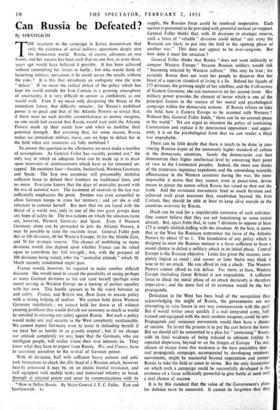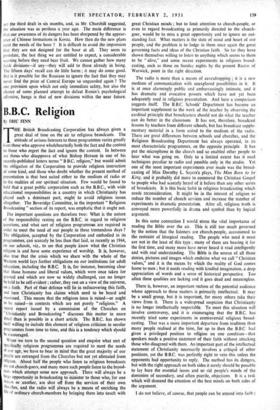Can Russia be Defeated?
By STRATLGICUS
THE reactions to the campaign in Korea demonstrate that only the existence of actual military operations deeply stirs
the democratic world. Russia, of course, advances on two fronts, and her success has been such that no one five, or even three, years ago would have believed it possible. It has been achieved without committing her forces to battle ; but who would think of launching military operations if he could secure the results without the risks 1 It is this that introduces an ambiguity into the term " defeat." If we mean the radical defeat of the policy which has kept the world outside the Iron Curtain in a growing atmosphere of uncertainty, it is very difficult to answer as confidently as one would wish. Even if we mean only dissipating the threat of the immediate future, that difficulty remains ; for Russia's mobilised power is so great and that of the Atlantic Powers so trivial that, if there were no such terrible counterbalance as atomic weapons, no one could feel assured that Russia would wait until the Atlantic Powers made tip their minds how and when to mobilise their potential strength. But assuming that, for some reason, Russia makes no immediate military move, can we hope to defeat her in the field when our resources are fully mobilised 1
To answer this question in the affirmative we must make a number of assumptions. As General Fuller has recently pointed out,• the only way in which an adequate force can be made up is to draw upon reservoirs of reinforcements which have so far remained un- tapped. He mentions four—Sweden, Switzerland, Western Germany and Spain. The first two countries will presumably mobilise sufficient force to defend their frontiers on traditional lines, and no more. Everyone knows that the days of neutrality passed with the era of national wars. The treatment of neutrals in the last war sufficiently emphasises the point. Sweden was even compelled to allow German troops to cross her territory ; and yet she is still reluctant to commit herself But now that we arc faced with the threat of a world war, only in one of the two great groups does any hope of safety lie. The two nations on which the situation turns are, however, Western Germany and Spain. Even if Western Germany alone can be persuaded to join the Atlantic Powers, it may be possible to raise the requisite force. General Fuller puts this at 100 divisions, 40 for Western Europe, 10 for the Middle East, and 50 for strategic reserve. The chance of mobilising so many divisions would also depend upon whether France can be relied upon to contribute her full strength ; but, with the prospect of 100 divisions being raised, even the " neutralist attitude " which M. Moch recently condemned might pass.
France would, however, be required to make another difficult decision. She would need to accept the possibility of seeing perhaps as many German divisions as she can raise herself (perhaps even more) serving in Western Europe on a footing of perfect equality with her own. This hurdle appears to be the worst between us and safety. France, and Britain too, iftust learn to season policy with a strong helping of realism. We cannot hold down Western Germany indefinitely ; we cannot hold her down at all without creating problems that would disturb our economy as much as would be entailed in ensuring our safety against Russia. But such a policy would make any real security in the West completely unattainable. We cannot expect Germany even to assist in defending herself if we treat her as hostile or as gravely suspect ; but if we change our attitude completely we may hope that the Germans, who are • intelligent people, will realise where their true interests lie. They know what they have to expect from Russia. We. and France, have to accustom ourselves to the revival of German power.
With 40 divisions, half with sufficient heavy armour and anti- tank formations to check the elite head of a Russian attack, however heavily armoured it may be, on an elastic frontal resistance, and half equipped with mobile tanks and motorised infantry to break through at selected points and sever its communications with its
• How to Defeat Russia. By Major-General I. F. C. Fuller. Eyre and Spottiswoode. Is. supply, the Russian force could be rendered inoperative. Each section is presumed to be provided with powerful tactical air-support. General Fuller thinks that, with 30 divisions in strategic reserve, such a force of " reliable " divisions could defeat " any army the Russians are likely to put into the field in the opening phase of another war." This does not appear to be over-sanguine. But how does it meet the situation ?
General Fuller thinks that Russia " does not want militarily to conquer Western Europe " because Russian soldiers would risk " becoming infected by Western culture." This may be true ; for certainly Russia does not want her people to discover that her boast of a superior standard of living is a lie. Behind her facade of 175 divisions, the growing might of her satellites, and the VolAsartnee of Eastern Germany, she can manoeuvre on her second front. Her military power provides the clement of terror which is one of the principal factors in the success of her moral and psychological campaign within the democratic nations. If Russia refuses to take the field, how is Eastern Europe to be reunited with Western ? Without this, General Fuller holds, " there can be no assured peace in the world." We are urged to abandon the policy of containing Communism and replace it by determined opposition ; and appar- ently it is on the psychological front that we can render a third war improbable.
There can be little doubt that there is much to be done in con- vincing Russian dupes of the immensely higher standard of culture in the democratic countries. Surely the democracies can best demonstrate their higher intellectual level by conveying their point of view to the Communist peoples. Indeed, the more one thinks of the numerous ingenious expedients and the astonishing scientific efflorescence in the Western countries during the war, the more impossible it seems that they cannot, even in peace-time, devise means to pierce the screen which Russia has raised to shut out the truth. And the resistance movements bred so much heroism and achieved such great successes that, established beyond the lion Curtain, they should be able at least to keep alive morale in the countries over-run by Russia.
Much can be said for a considerable extension of such activities One cannot believe that they are not functioning to some extent already. But, apart from that, to raise 7 divisions to oppose at least 175 is simply childish trifling with the situation. At the best, it seems that in the West the Russians outnumber the force of the Atlantic Powers by about 15 to 1. The foundation of any policy which is designed to meet the Russian menace is a force sufficient to have a sound chance to defeat a military attack in its initial phase. Central Europe is the Russian objective. Lenin has given the reasons, com- pletely logical as usual ; and sooner or later Stalin may think it wise to try an attack. He can afford to risk a check. The Western Powers cannot afford to risk defeat. For them, at least, Western Europe (including Great Britain) is not expendable. A sufficient force to check the initial phase of an attack decisively is therefore imperative ; and the mere fact of its existence would be the best propaganda.
Defeatism in the West has been bred of the recognition that, acknowledging the might of Russia, the governments are not attempting to raise forces in any way commensurate with the peri!. But it would wither away quickly if a real integrated army, fully trained and equipped with the most modern weapons, could be seen. Propaganda and resistance movements would then have a chance of success. To invert the process is to put the cart before the horse. But we should still be committed to a plan for " containing " Russia, with its fatal weakness of being reduced to ultimate futility b:• repeated dispersion, beyond or on the fringes of Europe. The onl. chance of escape from this weakness is the bare possibility that real propaganda campaign, accompanied by developing resistance movements, might be successful beyond expectation and compel Russia to take the field or come to terms. But the only foundation on which such a campaign could be successfully developed is the existence of a force sufficiently powerful to give battle at need with a real chance of success.
It is by this standard that the value of the Government's plans for defence must be measured. It cannot be forgotten that they arC the third draft in six months. and, as Mr. Churchill suggested, the situation was as perilous a year ago. The main difference is that our awareness of its dangers has been sharpened by the appear- ance of Chinese formations in Korea. How then do the new plans meet the needs of the hour ? It is difficult to avoid the impression that they are not designed for the hour at all. They seem to postulate, the last thing we are entitled to expect, a considerable Staining before they need bear fruit. We cannot gather how many fresh divisions—if any—they will add to those already in being. The fifteen days' recall can do little harm ; it may do some good. But is it possible for the Russians to ignore the fact that they may never find the prize of Central Europe so unguarded again ? The one provision upon which not only immediate safety, but also the chance of some planned attempt to defeat Russia's psychological offensive, hangs is that of new divisions within the near future.



































 Previous page
Previous page